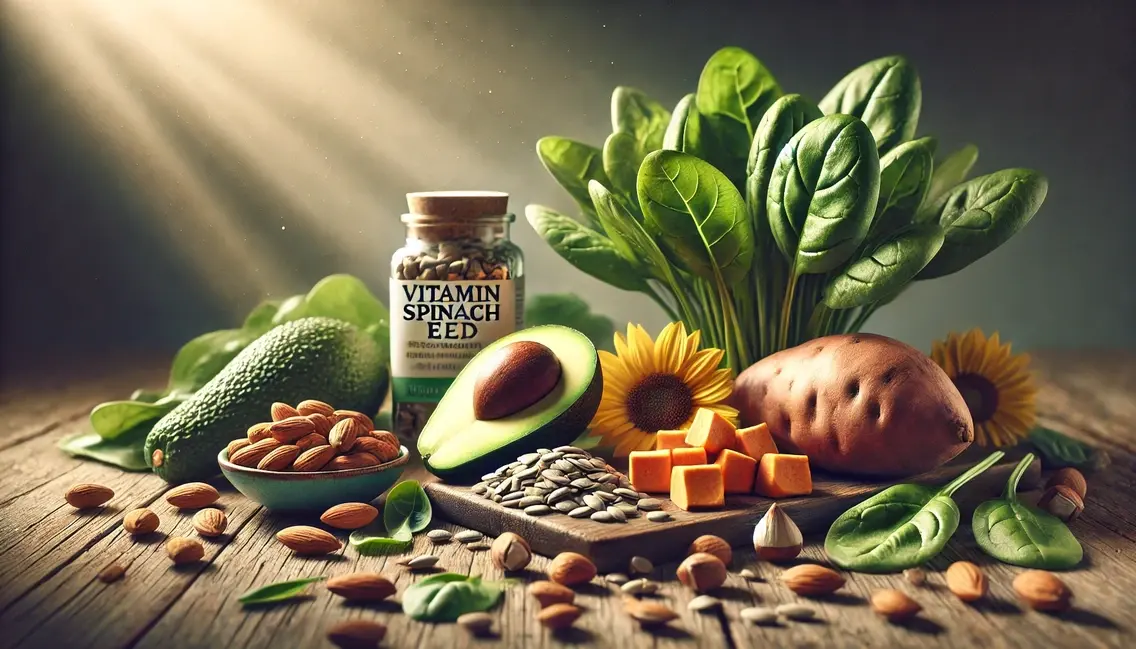The Secret Elixir: Unlocking Vitamin E’s Ultimate Benefits
Could the key to robust health and glowing skin be hidden in a simple vitamin? Vitamin E might just be the powerhouse you're overlooking. This often-underrated nutrient is an antioxidant dynamo, shielding your cells from the relentless damage of oxidative stress. But that's not all—it plays a pivotal role in bolstering immune defense and fortifying skin resilience, offering a natural barrier against harmful UV rays.
Yet, amidst the benefits lies a web of misinformation. Is more better? Experts caution that excessive dosages can lead to adverse effects, emphasizing the importance of balance. So, how do you harness the true potential of Vitamin E safely and effectively?
Drawing insights from the National Institutes of Health and key studies, we debunk myths and present a clear path to maximizing this vitamin's virtues. You’ll discover the ideal sources, dosages, and the science-backed reasons why vitamin E belongs in your daily regimen. Ready to explore the truth behind this nutritional gem? Let's dive into the remarkable wonders of Vitamin E.
Health Benefits of Vitamin E
Vitamin E is a potent nutrient celebrated for its antioxidant prowess and indispensable role in various bodily functions. Its ability to shield cells from oxidative stress and support overall vitality underscores its importance in a balanced diet.
Key Health Benefits
- Antioxidant Protection
Acting as a powerful antioxidant, Vitamin E protects cell membranes from the harmful effects of free radicals. By neutralizing these unstable molecules, Vitamin E mitigates oxidative stress, a known factor in the progression of chronic diseases and aging.
- Supports Immune Function
Vitamin E plays a pivotal role in immune health. Scientific studies suggest that adequate amounts of this vitamin can enhance immune responses, potentially decreasing the frequency and severity of infections.
- Promotes Skin Health
Known for its skincare benefits, Vitamin E helps defend against UV damage while supporting the skin’s natural barrier. Its anti-inflammatory properties contribute to skin repair and can reduce the visibility of scars and wrinkles.
Advancing Health with Vitamin E
Embracing Vitamin E’s wide-ranging health benefits can notably bolster your immune function, enhance skin health, and shield against oxidative damage. For those eager to integrate these benefits into their daily routine, consider Jamieson's Balanced Vitamin E Complex 400 IU with Mixed Tocopherols, which offers comprehensive cellular protection and supports cardiovascular health. Next, we'll explore the best dietary sources to ensure you achieve optimal Vitamin E intake each day.
Dietary Sources of Vitamin E
Explore the top natural sources of Vitamin E that contribute to its antioxidant benefits, immune support, and skin health. Incorporating these foods into your diet can help you maintain optimal Vitamin E levels and overall well-being.
Natural Sources of Vitamin E
- Almonds
Almonds are among the richest sources of Vitamin E in the tree nut family. They deliver a concentrated supply of alpha-tocopherol, the most active form of this vitamin, which supports heart health and defends cells against oxidative stress.
- Sunflower Seeds
Sunflower seeds also excel in Vitamin E content, offering a nutrient-dense snack packed with alpha-tocopherol along with healthy fats and essential minerals.
- Sunflower Oil
Known for its high Vitamin E content, sunflower oil enhances the bioavailability of the vitamin when included in daily meals, making it a practical option for increasing intake through cooking.
- Hazelnuts
Hazelnuts provide a significant dose of Vitamin E, promoting skin health and immune function. Their nutrient-rich composition includes beneficial fats and fibers.
- Spinach
Spinach is a versatile leafy green providing a good dose of Vitamin E alongside other essential vitamins and nutrients. It's easily incorporated into salads, smoothies, or cooked dishes for a healthy boost.
Challenges of Achieving Adequate Vitamin E Intake
While these natural sources are beneficial, meeting daily Vitamin E requirements solely through diet can be challenging for many individuals. Factors such as dietary restrictions, food availability, or lifestyle may limit consumption of these rich sources, potentially resulting in suboptimal intake.
To overcome these challenges and ensure you meet your Vitamin E needs, consider enhancing your diet with supplements. For those looking to maintain optimal cellular protection and cardiovascular health, consider Jamieson's Balanced Vitamin E Complex 400 IU with Mixed Tocopherols. This supplement provides a reliable source of Vitamin E in a convenient form, ensuring you receive a balanced intake of this crucial antioxidant.
Incorporating Vitamin E-Rich Foods
To work towards fulfilling your daily Vitamin E requirements, make an effort to incorporate these foods into your meals. Whether it's using sunflower oil for cooking or enjoying almonds and sunflower seeds as snacks, there are multiple methods to support adequate intake. Next, we'll explore the recommended daily Vitamin E intake and strategies for achieving it through these dietary choices.
Daily Intake for Vitamin E
Vitamin E is a crucial antioxidant important for shielding cells from oxidative stress, boosting immune function, and supporting skin health. Getting the right amount of Vitamin E is essential for maintaining overall wellness and preventing cellular damage.
Recommended Daily Intake
- 1-3 years: 6 mg (9 IU)
- 4-8 years: 7 mg (10.4 IU)
- 9-13 years: 11 mg (16.4 IU)
- 14-18 years: 15 mg (22.4 IU)
- Adults: 15 mg (22.4 IU)
- Pregnant women: 15 mg (22.4 IU)
- Breastfeeding women: 19 mg (28.4 IU)
Meeting Your Daily Vitamin E Needs
Achieving sufficient Vitamin E intake is typically manageable with a diet rich in nuts, seeds, and vegetable oils, such as sunflower oil and almonds. To avoid any complications from overuse, it's crucial to consult with a healthcare provider before considering supplements. For those looking to integrate Vitamin E into their regimen, many rely on Jamieson's Balanced Vitamin E Complex 400 IU with Mixed Tocopherols to protect cells and support cardiovascular health efficiently. Consistency in maintaining these levels is key to ensuring long-term benefits.
Understanding the symptoms of Vitamin E deficiency and ways to prevent them will be our next focus.
Deficiency of Vitamin E
While not commonly discussed, a deficiency in Vitamin E can have significant repercussions due to its essential role in safeguarding your body's vital systems. As a potent antioxidant, Vitamin E is crucial for maintaining immune and neurological functions, and an inadequacy can disrupt these and other physiological processes.
Deficiency Symptoms and Consequences
- Neuromuscular Issues
A deficiency in Vitamin E might manifest as peripheral neuropathy, which can include symptoms like muscle weakness and impaired coordination. These symptoms may lead to significant mobility challenges and affect your daily life.
- Impaired Immune Function
Vitamin E plays a vital role in bolstering your immune system. A deficiency could weaken your body's defenses, leaving you more vulnerable to infections and illnesses that could otherwise be mitigated.
- Vision Problems
The protective function of Vitamin E against oxidative stress means that a deficiency can result in retinal damage, potentially leading to vision deterioration. Such effects emphasize the importance of maintaining adequate levels of this vitamin for eye health.
- Cognitive Impairments
In more severe cases, inadequate Vitamin E levels are linked to neurological issues, contributing to cognitive decline. This is due to Vitamin E's role in protecting brain health against oxidative stress.
For those concerned about maintaining optimal health, it's essential to ensure a balanced intake of Vitamin E. Foods rich in this vitamin, such as nuts, seeds, and vegetable oils, play a crucial role in preventing deficiency symptoms. However, dietary sources alone may not always suffice, especially given lifestyle and dietary restrictions. For a reliable and well-rounded boost to your Vitamin E intake, consider incorporating Jamieson's Balanced Vitamin E Complex 400 IU with Mixed Tocopherols into your routine, which supports cell protection and cardiovascular health effectively.
Preventing Vitamin E Deficiency
It's paramount to incorporate Vitamin E-rich foods like nuts, seeds, and vegetable oils into your diet to avert these risks. Maintaining a balanced diet helps support healthy Vitamin E levels naturally.
Let's delve into frequently asked questions concerning Vitamin E, shedding light on its vital importance and commonly misunderstood aspects of its consumption.
Conclusion
In the quest for optimal health, Vitamin E emerges as a crucial yet often overlooked ally. This powerhouse nutrient doesn't just enhance skin vitality and boost immune defenses—it acts as a formidable shield against oxidative stress that could undermine your well-being. The real question now is, are you leveraging this potent tool effectively? The path to harnessing Vitamin E's full potential lies in a balanced approach, combining rich natural sources with informed supplementation when necessary.
As you ponder your next steps, consider this: What small but impactful change will you make today to integrate Vitamin E's benefits into your lifestyle? Perhaps it’s adding a handful of almonds to your breakfast routine, or maybe it's discussing the right supplement options with your healthcare provider. Share your thoughts and action plans with your fitness community, because the journey to health is one best traveled together. Remember, every choice you make today paves the path to a healthier, more resilient tomorrow. Stay committed to fueling your body with the nutrients it needs, and watch as the powerful effects of Vitamin E unfold in your life.

